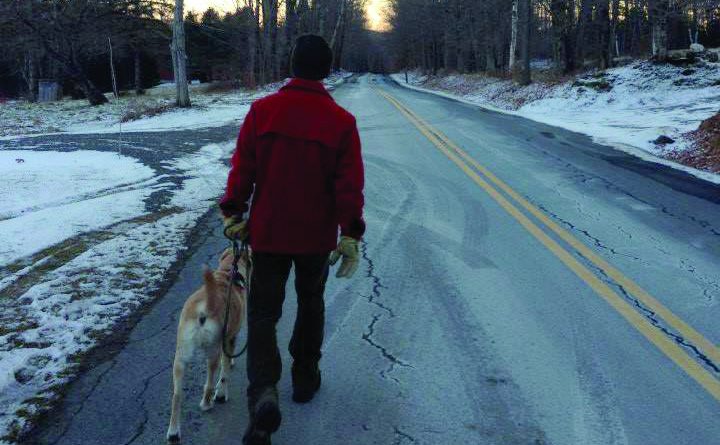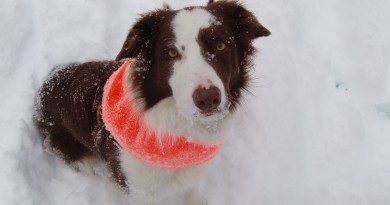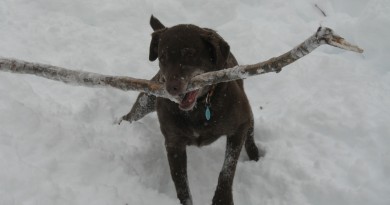The Person Your Dog Thinks You Are
I was picking through the slightly imperfect sock bin at the Outdoor Gear Exchange in Burlington recently when I noticed the t-shirt on the person next to me. It featured bold black lettering and a shaggy-haired dog sitting with its head cocked at an angle that suggested it was trying very hard to listen.
“Be the person your dog thinks you are,” the shirt said.
It’s a favorite motto of mine— because it’s the most accurate and concise observation I’ve found on how our pets see us and how much they can shape our lives if we allow them.
A poet friend of mine wrote that to miss someone or something is to experience a haunting—a clear presence in spite of an obvious absence.
Though it has been three months since our Labrador Retriever, Winnie, passed away, my parents’ house in Marlboro is still strewn with half-chewed toys, water and food bowls, and towels for wiping muddy paws. I doubt they’ll ever get nearly 15 years worth of dog hair fully out of their sweaters or her favorite rugs. I still carry one of her vaccine tags in my wallet; the metal disk has left a heart-shaped imprint in the leather. Winnie is still very much here.
It’s easy for those details and memories to overwhelm me. That happens, from time to time, but the feeling always passes when I consider that Winnie left behind much more than a collection of stuffed animals, a collar and a leash.
Rewind the clock to when I was 10 years old with wild red hair and a freckled, sunburned face, walking on the side of the road, followed behind by a wriggling puppy, tripping over its own oversized paws. When she got too tired, I picked her up and carried her under an arm. This tiny thing would incur terrific amounts of destruction and frustration but she was mine to protect. The responsibility filled me with awe and made my chest swell with pride.
On those early walks, I learned patience and how to shepherd this small life as it sniffed and plodded its way down the road with me. Besides, when she gained weight and grew into those paws, it was my turn to try to keep up.
In her later years, Winnie’s walks could last all afternoon. Endlessly stubborn, she always wanted to keep going, putting her head down and marching even when her aging body must have been screaming to stop. The toll of the years was plainly visible: she developed cysts on her legs and under her stomach that impeded her walking. The pain medicines damaged her liver and she became a fussy eater. “It’s a case of too many birthdays,” her vet quipped.
On one of our last walks in early winter, her hips gave out and she collapsed on the pavement. Her eyes went wide in panic, looking back at her legs splayed awkwardly and then at me. Darkness was falling and the temperature was near freezing. I had carried her home as a puppy and 15 years later, I carried her again, held to my chest in both arms. We were coming full-circle.
We began making dilatory outings to a field behind the house. I’d bring a mug of tea or a beer and wander alongside her while she explored. There was never any rush and we didn’t need a leash. It was her time to go at her own pace and simply be a dog. When she pointed her nose at the house, we’d start our slow journey home.
The day she died, I drove home to be with my family. We spent the afternoon taking turns laughing at memories of messes made and crying over our shared heartache. I was a mess, awash in the awareness of how much time had passed in our years together and how profoundly changed I was.
The reasons for adopting are many and the expectations we put on our dogs can be just as varied; we require them to assist, hunt, work, protect and serve, but whether or not we realize it, the relationship is always a two-way street. Winnie required me to take on nobler qualities; to be loyal, compassionate, gentle, brave, considerate and merciful. She kept me on the straight-and-narrow and as long as I did my best to live up to her expectations of me, then I was doing well enough.
But that first afternoon without her, my wheels were spinning. With so much love put into my life, I needed to find a place to put it now. The solution, I decided, was to put it everywhere; apply it to every new relationship, every adventure and every project as unconditionally as it was put into mine.
Since Winnie’s passing, my parents have confronted the uncomfortable questions of if and when they should get another dog. My mother misses Winnie, giving her the mostly empty yogurt container and having her curled under the desk, keeping her toes warm while she worked.
My father and I miss something deeper.
“It’s not just that I miss Winnie,” he said. “It’s that I miss the person your dog requires you to be.”
And this brings me back to that t-shirt. Imagine a world where everyone lived up to that.



